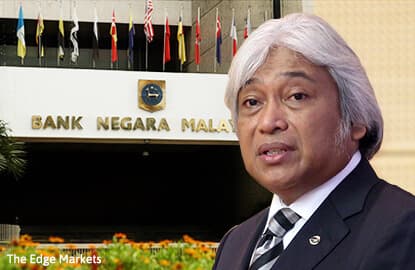
KUALA LUMPUR (Oct 10): A "new real economy" calls for a new operating landscape, Bank Negara Malaysia (BNM) Governor Datuk Muhammad Ibrahim said, and with it the need for regulations to be localised, taking into account an economy's specific needs and stage of readiness.
He noted that in the past, when economic agents and activities — ranging from textile production to banking industry — were clearly defined and more homogenous, a country could rely on internationally-mandated metrics to assess compliance to a certain set of standards.
"Unfortunately, those approaches are fast reaching their limits of effectiveness. As such, regulations need to be localised, particularly taking into account an economy's specific needs and stage of readiness," he said in his address on 'New Models and Sources of Prosperity in an Uncertain World' at the 31st Annual G30 International Banking Seminar in Washington, the US, yesterday.
"For instance, while we universally share the importance of product safety, welfare of workers and consumer protection, the pace and types of regulation for Uber and Airbnb have been highly varied across countries. With economic growth increasingly stemming from technopreneurs and start-ups, productions and markets are becoming less and less homogenous.
"(As such,) policymakers may need to develop new systems of regulations that is flexible enough to adapt, and robust enough to manage the rapid technological advancements," said Muhammad.
"(They need) to create an enabling environment to expedite the rise of this new real economy. From the emerging markets perspective, a critical aspect here is infrastructure readiness — but with a bias towards the new economy. Under the new scenario, virtual connectivity is no longer an aspiration, but an imperative," he added.
Muhammad stressed that policies must not stifle growth, but at the same time not at the expense of a resilient economy.
"The new real economy promises ease of greater access to both consumers and producers, therefore monopolistic policies, rent seeking activities or activities or rules that prevent competition need to be removed. Proportionality, thus, is the key adjective in the management of the new economy.
"Economies need tailor made rules to suit its own unique characteristics. One size fits all approaches to regulations require rethinking and might no longer be relevant in our dynamic world. The challenge to policies in the context of the new economy is daunting, but the dividends are immense," he said.
Muhammad pointed out that in the new real economy, value creation will no longer just be generated by traditional growth drivers such as manufacturing and banking services.
Instead, it is likely to be characterised by digital technological gains of unprecedented scale, scope and speed, possibly akin to the industrial revolution the world experienced 200 years ago, he said.
He cited the integration of advanced manufacturing and services through the Internet of Things (IoT), which is currently the domain of advanced economies, accounting for all top 20 companies in this field.
"In the advanced supply chain manufacturing production for instance, the design resides mostly in advanced economies although some of the production facilities may be developed all over the world.
"But unlike in the old economy where the consumption of these high-end products predominantly lies in the advanced economies, the emerging economies are now vast markets for these products. As technological advancement continues to increase the affordability of high-end products, the expansion of consumer markets in emerging economies is further boosted by rising income and dynamism in these economies," he said.
"If we continue to view the current economy through the lens of the 'old real economy', we will be engrossed with traditional thinking, such as whether jobs, particularly those in the manufacturing sector, are being created in advanced or emerging economies. We will be too preoccupied with the idea of offshoring and onshoring and movement of jobs," added Muhammad.
"In reality, shared global prosperity is not a zero-sum game. In my opinion, our current economic model could well serve us, if it is one that is underpinned by opportunity, complementarity and technology.
"There are three reasons why I say this. First, the rapid income and population growth in emerging markets have turned these economies into large and growing consumer markets. Second, the rising demand for technologically intensive goods and services have reignited the growth potential for advanced economies, particularly in the fields of advanced services and manufacturing. Third, the advent of technology has lowered barriers to entry significantly and narrowed the gap in comparative advantage between emerging and advanced economies," he said.
Muhammad pointed to financial intermediation as a good example of how disruptive technologies are increasingly redefining the financial landscape.
"Given the imminent expansion of Fintech innovation, central banks all over the world have embarked on developing regulatory mechanism that balances the risks and opportunities posed by Fintech phenomenon. In fact, BNM is one of several central banks to introduce a regulatory sandbox to allow experimentation of genuinely innovative ideas while preserving consumer protection.
"It is clear that the rules have changed and regulatory authorities are striving to cope with this new environment," he said.
Muhammad cited Malaysian taxi drivers as another group affected by disruptive technologies such as ride-sharing apps.
"While they have been offered small grant to start anew, the real challenge lies in the ability of affected incumbents to change their mindset and rise to the challenge of finding a new operating model. In some respects, effective adjustments are mostly about adaptable skill sets.
"Thus, the re-integration of displaced incumbents needs to place emphasis on life-long learning and expansion of skill sets with the hope that these will raise their agility and adaptability to future shocks," he said.